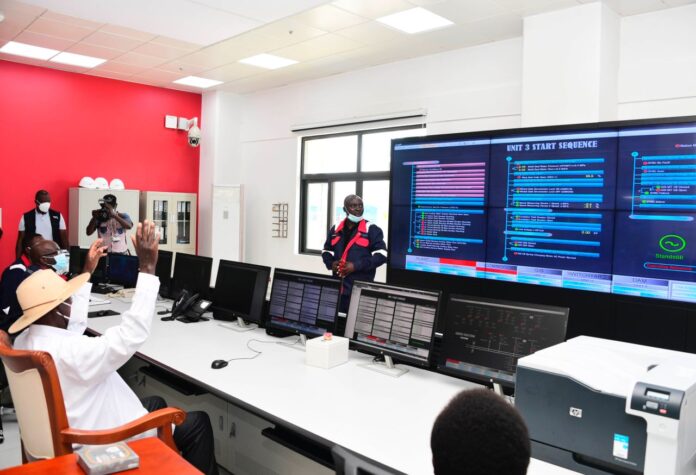President Museveni has commissioned the Karuma Hydropower Plant in Kiryandongo District.
The 600 MW hydropower project was constructed by Sinohydro Corporation Limited, a Chinese company.
During the commissioning, President Museveni thanked the government of China for funding the construction of the power plant and acknowledged Sinohydro for delivering quality work.
“At least now we have made progress, but we have a long way to go; our target is to have enough electricity at a low cost,” said President Museveni during the event on Thursday.
With the addition of 600 Megawatts from the Karuma Hydropower Project to the national grid, Uganda’s total power generation now stands at 2,046.5MW, significantly surpassing the peak demand, which averages between 900 MW and 1,000MW.
Karuma is Africa’s largest Underground power station and 14th largest in the world, with its electrical-mechanical installations situated 100 meters underground.
With a capacity of 600 MegaWatts, it will generate 4.37 billion kilowatt hours of electricity annually.
Museveni said Uganda’s hydropower journey began with the Owen Falls Dam in 1954, a pioneering project that laid the foundation for the country’s energy infrastructure.
“Over the years, this vision has expanded with the commissioning of the Kiira Hydropower Station in 2003 and the Isimba Hydropower Project in 2019, further increasing our power generation capacity,” said Museveni.

According to the Electricity Regulatory Authority (ERA) Chief Executive Officer, Eng. Ziria Tibalwa Waako, “The 600MW Karuma Hydro Power Station has one of the lowest tariffs at US Cents 4.97 per kilowatt-hour.”
“The Karuma Megawatts support the country’s industrialization agenda by powering small, medium, and Large business enterprises,” said Eng Tibalwa.
“Additionally, Karuma HPP enhances the country’s capacity for regional power trade, ultimately attracting increased foreign investment and revenue,” she said, adding, “The Karuma Hydropower Project, our most ambitious to date, continues this legacy of progress.”
ICT
The President also told the gathering that Uganda has four key sectors of the economy: commercial agriculture, manufacturing, services, and ICT.

He emphasised that to effectively run these sectors, the country needs low transport costs, cheap and reliable electricity, and access to markets.
“That is why you hear that we are repairing our railway lines and will construct more railway lines to achieve lower transport costs,” President Museveni stated.
Additionally, the President highlighted the importance of skilled human labor, noting that all factories across the country rely on skilled workers, a factor vital for boosting the economy.
Regarding the issue of vandalism of Electricity infrastructure along the lines, the President promised to collaborate with the Cabinet to devise a lasting solution to the problem.
He also cautioned Ugandans, especially those in agriculture and manufacturing, against borrowing from money lenders.

“Borrow from UDB, Emyooga, or PDM. I have nothing to do with money lenders because they are your enemies. I am going to take action against them; I will crush them because they are criminals.”
In her remarks, Vice President H.E. Jessica Alupo stated that the commissioning of the Karuma Hydropower Plant marks a significant milestone in Uganda’s development.
“The Karuma project is the steppingstone for Uganda to achieve its target of 52,000 MW by 2040,” she said.
China’s support
The Minister of Energy and Mineral Development, Hon. Ruth Nankabirwa, noted that the project was partly funded by the Government of Uganda (15 percent) and the Exim Bank of China (85 percent).
The Ambassador of China to Uganda, H.E. Zhang Lizhong, expressed his delight at the realization of the Karuma Hydropower Plant, describing it as a historic development for Uganda.
“I am happy to say that today our bilateral relations have reached their highest level,” he remarked.
Eng. Badru Kiggundu, Chairperson of the Karuma and Isimba Hydropower Project Steering Committee, emphasised that Karuma is Africa’s largest underground hydropower plant. He thanked the contractor for successfully delivering a high-quality project.
The commissioning ceremony was attended by ministers, members of parliament, permanent secretaries, members of the business community, and other distinguished guests.

